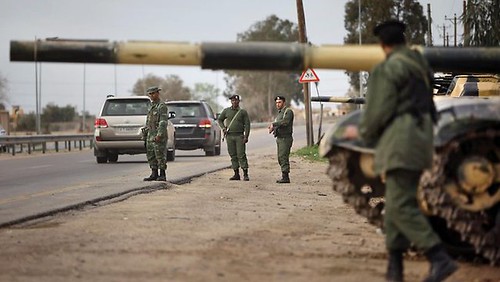
Libya forces strike back at the monarchists and CIA-trained counter-revolutionaries seeking to takeover the North African state at the behest of U.S. imperialism. The Obama administration has called for the removal of the former AU leader Gaddafi., a photo by Pan-African News Wire File Photos on Flickr.
Gaddafi's forces hit back in Libya as Britain tells Nato: you must do more
Government troops unleashed a barrage of rockets and mortars against rebels outside of Misrata, followed by an infantry assault
Xan Rice, Chris Stephen, Richard Norton-Taylor guardian.co.uk, Wednesday 8 June 2011 20.48 BST
Muammar Gaddafi's forces have responded to Nato's intensified aerial bombardment of Tripoli by launching a heavy attack on rebel positions outside the liberated city of Misrata.
Government troops unleashed a barrage of Grad rockets and mortars against rebel positions to the east, west and south of Misrata early on Wednesday morning, and followed up with an infantry assault. By mid-afternoon, the Hikma hospital reported 10 rebel fighters dead and 26 wounded.
The attack came as Liam Fox, the defence secretary, expressed increasing frustration with the slow progress of the western-led military campaign, forcefully telling fellow Nato ministers at a meeting in Brussels they should contribute more.
The attack on Libya's third biggest city was the heaviest since loyalist forces were overwhelmed there in April, and came a day after Nato pounded military sites in Tripoli from the air. It was the heaviest 24 hours of bombing yet in the capital, with the alliance conducting 66 strike sorties.
The targets struck in and around the city included six command and control centres, two anti-aircraft guns, a radar system and a vehicle storage facility, according to Nato. The worst damage occurred at Gaddafi's Bab al-Aziziya compound, where several buildings were destroyed, sending giant plumes of smoke into the sky. Bombing continued on Wednesday morning, but with less intensity.
Gaddafi, who is in hiding in the capital and has rarely been seen or heard from in recent weeks, reacted with fury to the attack, insisting he would fight to end in an audio broadcast on state television. Government spokesman Moussa Ibrahim said 31 people – soldiers, guards, and civilians – had been killed in Tuesday's bombing raids, and described Nato as "the forces of evil". The casualty figure could not be independently verified.
In an attempt to show that Nato had struck non-military targets, government minders on Wednesday morning took journalists to see a "nature reserve", occasionally used by Gaddafi to entertain guests, which had been hit the previous evening.
The missiles had destroyed two trucks, one of them very large, a golf cart, a large tent and several containers, including one that had computer equipment and a paper shredder inside. Officials were unable to explain what the vehicles were doing on a nature reserve, or why there were windsocks nearby, which appeared to suggest the presence of an airfield.
The surge in the number of attacks on targets in Tripoli, which follows the incorporation of attack helicopters into Nato's mission on the weekend, is a clear attempt to end the military stalemate on the ground and hasten Gaddafi's exit. Nearly four months into the conflict, rebels control large parts of eastern Libya, a string of towns in the western mountains, near the border with Tunisia, as well as Misrata. Opposition fighters there said they had repelled Wednesday's attack by government forces.
"Our will is stronger than theirs," said Sadik Ibrahim Mohammed, an injured rebel fighter. "The Shebab [rebels] have the heart. The Gaddafi soldiers ran away."
But the various frontlines are all still some way from Tripoli, where the regime still has a tight grip on the population. The Libyan government says that the escalated aerial campaign against Gaddafi had gone far beyond the mandate of protecting civilians, a point some critics of the operation outside Libya agree with.
Fox told a meeting of Nato ministers: "I firmly believe that we must intensify our pressure on the regime and it is imperative our military commanders have the assets and capabilities they need to do the job all of us around this table have asked of them: to defeat those regime elements which continue to threaten civilians."
He added: "Let me be frank. Nato is not just about military hardware. It is also about values. And those values are not an optional extra."
No comments:
Post a Comment